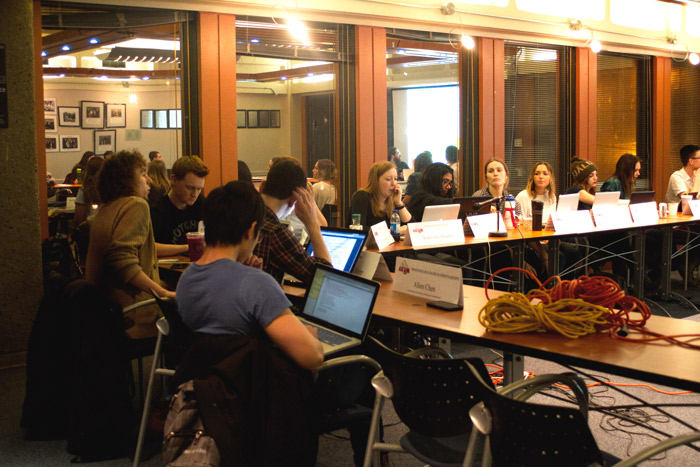At its March 24 meeting, Students’ Society of McGill University (SSMU) Council discussed the McGill Board of Governors’ (BoG) recent decision not to divest from the fossil fuel industry, and passed two motions: For SSMU to officially stand in solidarity with Black Lives Matter Toronto and an official policy on indigenous solidarity.
Response to BoG’s decision not to divest
SSMU Council released a statement in favour of divestment, countering the decision of McGill’s BoG not to divest from the university’s holdings in fossil fuel industries. The BoG based its decision upon the report written by the Committee to Advise on Matters of Social Responsibility (CAMSR), releasing their decision in a special meeting on March 23. The report stated that CAMSR does not believe significant social injury had occurred by investment in fossil fuels, which Vice-President (VP) External Emily Boytinck singled out as a particular flaw.
“I think that this is shameful,” said Boytinck. “How dare they say the impact is not grave? They should speak with the 150,000 people who die every year due to climate change. They should speak with the indigenous communities who are the first people affected by this issue.”
Boytinck also addressed concerns over security at the BoG meeting directed at students attending as representatives from Divest McGill.
“Divest McGill has been present at every single board meeting this year,” Boytinck said. “It was the first time we were escorted up in James administration by security. It was a huge slap in the face for a committee who has repeatedly called us a partner. I was disappointed and shocked by the way the [BoG] treated students at that meeting.”
Boytinck highlighted the lack of transparency in the decision-making process, as none of the CAMSR meetings on the matter were open to the public, and no information is available on the experts with whom CAMSR consulted.
“SSMU will continue to work with Divest McGill to find a way for this question to be brought back to the Board of Governors in an open and consultative manner,” Boytinck said.
Solidarity with Black Lives Matter Toronto
Council passed a motion brought forward by the Black Students’ Network (BSN) for SSMU to officially support the Black Lives Matter Toronto organization, following their recently-released statement of solidarity calling on community organizations, labour representatives, individuals and the broader global community to protest against police brutality. The statement demands the release of the names of the officers who shot and killed Andre Loku, a 45-year-old father of five last July. Protestors are also for charges to be laid against the officers since they have been cleared of any liability.
VP Internal Omar El-Sharaway brought forward the concern that the motion might be viewed as divisive, quoting the results of a student experience survey which revealed that students would prefer SSMU to be “less political and more fun.”
Boytinck cited the importance of SSMU taking a stance on this issue, given its connection to McGill students.
“This directly affects students at McGill,” Boytinck said. “What we consider to be a student issue and not to be a student issue, is in and of itself a political choice.”
VP University Affairs Chloe Rourke added her agreement to Boytinck’s response.
“I take issue with some of the claims that SSMU should be less political,” Rourke said. “It’s important to quantify and qualify what you mean by that. Student unions have historically played a role in human rights movements across the world. Remaining neutral is also very much a political choice.”
Policy on Indigenous Solidarity
Council approved a motion to adopt a policy on Indigenous Solidarity, drafted by Indigenous Affairs Coordinator, Leslie Anne St. Amour, following consultation with various indigenous student groups, staff, and faculty members.
“The policy covers many areas, particularly focusing on how SSMU can better support McGill’s Indigenous students, as well as lobbying the university to hire more indigenous staff and faculty, and increase indigenous course content,” St. Amour explained.
St. Amour addressed the lack of physical spaces on campus for indigenous student groups as one area SSMU can work to improve upon through this policy.
“There is only one space on campus which allows for [the cleansing ceremony of] smudging, First Peoples House, and it is not a great space for holding large events,” St. Amour said.
The policy also obliges the office of the VP External to reach out to indigenous communities at the beginning of the academic year, and continuously throughout the year as relevant issues arise.







